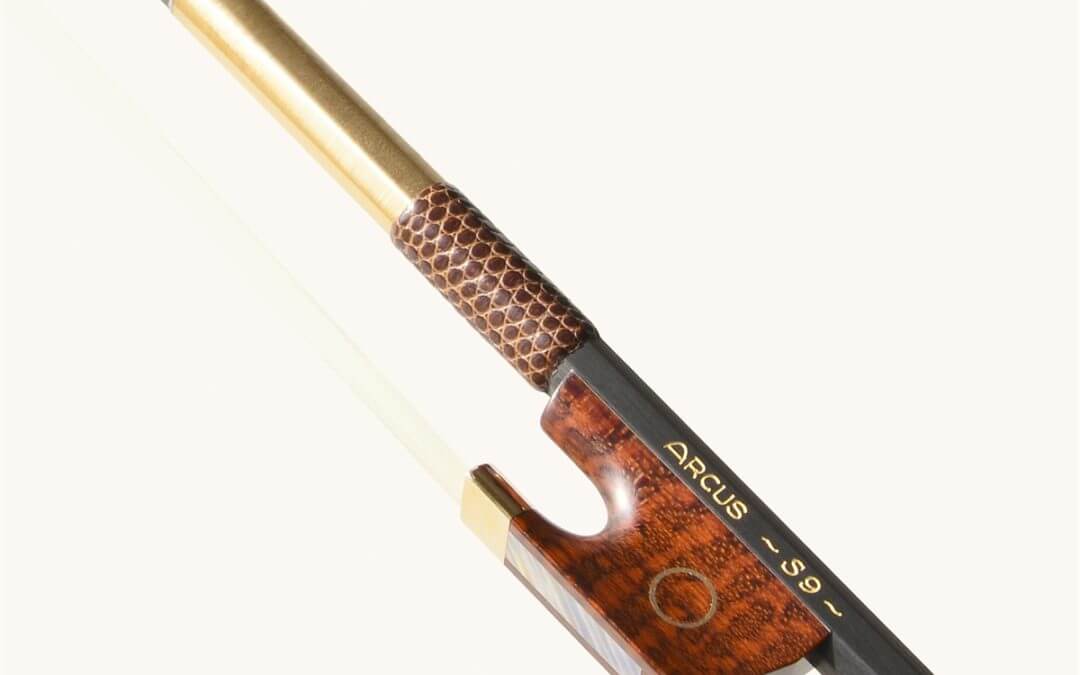Mijn klant Mark Nelson, professioneel altviolist, is Arcus strijkstokken aan het proberen en is zo vriendelijk geweest zijn ervaringen te delen.
“MY STORY SO FAR
It comes from me noticing that the S7 has some remarkable qualities.
Firstly – in its use of zero compression – the bow floats in a way that reduces the extra ‘distal limb synergy’. On any instrument.
Meaning I waggled lower spine to compensate for the inverted U (Tourte bow ideal design) too much.
Not such an uncommon thing for powerplayers. Look at www.sofiamusicschiool.nl/webwavs/disc.htm
Even when sitting. The last four bars of pag 1st caprice (Paganini, red) were done with a Berg bow, heavily accenting the penultimate return on D string (saltato) to G string in high positions. A common issue, albeit compression in raw form.
Course might have been something to do with breaking 3 tandems in places where they had never seen a bike before (Skippers in New Zealand 40 seated river crossings on a tandem – pple in land rovers have been known to drown doing same).- but it was no problem, bike just needed TIG welded afterwards.
Pity It took me so long to realise that not only did Paganini never perform publically his caprices – but the zen like kung fu approaches – gleaned from the Russians- just guarantee early burn out – unless ergonomic attention is always servant to artistic ideal.
Which is generally rare to hear, either on stage, or in the classroom.
Talent is balance. Balance is rarely seen as needing to be taught.Why???
Complex movements are resolved by uncompressed antagonistic contractors… (twitch muscles). Problem is that large muscle ( Prime movers) require tension (lessness) regularly reduced to alternate compressions, relaxation to less than 5% of twitch muscles, in 90% of exellent teaching.
It shouldnt be.
Balance is what realeases compression.
Art is humourous disfigurement.
Menuhen preferred the term ‘slight deformation’ ,while referring to even great performances.
So what I consider a gift from heaven is a bow which quietly reflects all past deformation.
In my case, as compressions.
I noticed that my plethora of spinal compression belts simply were rendered obsolete in the 3rd week of playing an S7 viola Arcus bow – on vl and vla.
I found that Arcus simply reduces players to balance.
Yes that included a lot of learning to play (on lesser vla/vl + bows) on a giant swiss ball (balancing precariously 1,2 metres above ground ,feet seeming miles from their ape like instinct to grasp of the floor,as if a branch!)
To find a stick to walk with, defense ,acquisition , drawing in the sands of time , – on the cliff face of uncertainty, becomes the driving reason behind the serious student’s striving for perfection. Reason may be seen as compressed desire.
But I could not imagine a nicer way of letting the bow breathe ,than allowing their medically responsible design to do it for the violin ,or viola.
It was a little naughty to use it as hybrid between vl and vla- but – space between the stick and hair is why pag himself performed his greatest concerts on merely barok bows and setup. Coincidental to his switch to Tourt’s persuasion – – he found the elusivity of analysis reduced his stellar career to but 10 international years. (Compared to Ysaye’s 40 years)
So I am puzzled, to say the least – as to Arcus’ modesty- The bows are simply a medical prerequisite for all players who still like the smell of burning rosin, as they play!
And thank god someone realised the classical need for some tall player’s build not to be fitted into Tourte’s compressed maths!.
I would like to show how ,maybe I will make a film when I’m ready.
bleatings
Mark N”



